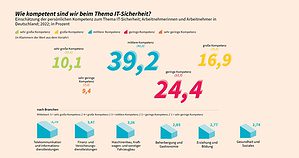
When it comes to IT security, employees in German companies have a lot of catching up to do: almost 34 percent have little or very little skills and are therefore risking the security of their company from cyber attacks - especially in the healthcare sector.
Cyber criminals have an easy time in German companies. Due to the poor knowledge about IT security, the workforce is not prepared for an attack in an emergency. More than a third of the survey participants rated personal competence as “low” or “very low”. Only every tenth employee sees himself as having very high abilities in this area.
Employees lack basic IT knowledge
Compared to 2021, the value of those who consider themselves low to low skilled increased by around 7 percent. This results in an urgent need for action, because cyber attacks on companies are quickly successful or turn out to be more serious if the workforce does not know what to do in an emergency. A high degree of security awareness is required to make employees part of the company's cyber defense system.
“Many employees in companies lack basic knowledge of IT security. This is alarming. Cybercriminals have such an easy game. It is therefore important to increase the level of security awareness and train staff accordingly. This must be part of every IT security concept in the company," says Andreas Lüning, founder and CEO of G DATA CyberDefense AG.
The health sector suffers from a lack of skills
The workforce in the telecommunications and information services sectors have the highest level of knowledge in the area of IT security. The employees of the financial and insurance service providers also attest to their good skills. In contrast, the area of health and social affairs brings up the rear. In the healthcare sector in particular, there are currently a number of digitization projects pending, for example the digital patient file. However, it is precisely in this area and in the social area that employees suffer from a high workload, which in this case endangers IT security.
Study "Cyber Security in Numbers"
The study "Cybersecurity in Numbers" is characterized by a high information density and particular methodical depth: More than 5.000 employees* in Germany were surveyed as part of a representative online study on cybersecurity in the professional and private context. The experts from Statista conducted the survey and, thanks to a sample size that is well above the industry standard, they are able to present reliable and valid market research results in the "Cyber Security in Numbers" booklet.
More at GData.de
About G Data With comprehensive cyber defense services, the inventor of the anti-virus enables companies to defend themselves against cybercrime. Over 500 employees ensure the digital security of companies and users. Made in Germany: With over 30 years of expertise in malware analysis, G DATA conducts research and software development exclusively in Germany. The highest standards of data protection are paramount. In 2011, G DATA issued a “no backdoor” guarantee with the “IT Security Made in Germany” seal of trust from TeleTrust eV. G DATA offers a portfolio from anti-virus and endpoint protection to penetration tests and incident response to forensic analyzes, security status checks and cyber awareness training to defend companies effectively. New technologies such as DeepRay use artificial intelligence to protect against malware. Service and support are part of the G DATA campus in Bochum. G DATA solutions are available in 90 countries and have received numerous awards.

